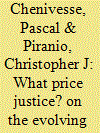|
|
|
Sort Order |
|
|
|
Items / Page
|
|
|
|
|
|
|
| Srl | Item |
| 1 |
ID:
133283


|
|
|
|
|
| Publication |
2014.
|
| Summary/Abstract |
The rhino-poaching crisis in South Africa raises questions about whether it should be tackled through judicial processes or by the application of hard-power methods. The poaching of wildlife has traditionally been met with a harsh response to send a clear message of punitive deterrence. While the reaction of the South African authorities has been no different, the contemporary threat posed by poaching intersects with, and is complicated by, wider concerns such as border security and immigration. In many respects, this has led to what can be termed the 'rhinofication' of South African security. South Africa has a long political tradition that relies on force rather than dialogue, negotiation and reform. Yet, the hard-power response to protect the rhino and other large fauna, though necessary at one level, often runs up against the economic frustrations and temptations of a large, predominantly black, under-class, which for generations has been excluded from wildlife management and conservation by white 'exceptionalism'. Poachers are thus transformed through their counter-cultural actions into what Eric Hobsbawm termed 'social bandits'. While this social chasm lies at the heart of the 'rhino wars', it is clear that in practical terms the lack of a political/poaching settlement in the form of a racially inclusive conservation strategy almost certainly guarantees their continuation.
|
|
|
|
|
|
|
|
|
|
|
|
|
|
|
|
| 2 |
ID:
108250


|
|
|
|
|
| Publication |
2011.
|
| Summary/Abstract |
Following the Second World War, evolving notions of human rights have been met by evolving understandings of rights that should be afforded the accused in judicial processes. The following considers this evolution in proceedings stretching from Nuremberg to The Hague, as a struggle between forces that have given birth to each successive stage in international criminal justice, as well as of forces that have grounded rights of defence as advancing the cause of justice itself. Indeed, while notions of 'right to fair trial' and 'equality of arms' suffer from conflicted understandings over what consists in justice, and from conflicting interests over what powers should be afforded parties in the judicial process, this article suggests that the primacy afforded rights of the accused reflects, most evidently in the International Criminal Court, the growing acceptance of liberal democratic notions that justice is most clearly founded not on the treatment of victims, but on the treatment afforded those who mistreat others.
|
|
|
|
|
|
|
|
|
|
|
|
|
|
|
|
|
|
|
|
|